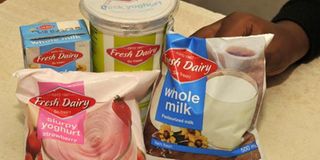Rising milk price hits consumers

Although the price of Fresh Dairy has not changed, the prolonged dry spell in the country is beginning to push prices of milk and related products higher than it has been in recent times. FILE PHOTO
What you need to know:
Consumers of milk will have to dig deep into their pockets to have the product on their menu because of rising prices.
Dorothy Nakaweesi writes.
Milk prices in the country are fast increasing, a scenario which has been caused by the prolonged drought in the country thus affecting the cattle corridor.
A litre of unprocessed milk at the farm-gate has gone up to between Shs1,100 and Shs1,200 from Shs750 while for processed and packed milk consumers are parting with Shs3,000 to Shs3,200 a litre from Shs2,800.
Mr Steven Aikiriza, a retired Dairy Development Authority coordinator for south western Uganda, and an expert in this industry, shared: “Processors are moving door-to-door looking for milk from farmers. We are worried that if the country doesn’t receive enough rain there will be no milk!”
The areas which have been hit by the dry spell are Isingiro, Kazo in Kiruhura District, Nyakashashara, Sanga and Kikatsi which have the highest numbers of animals.
In an interview with Prosper Magazine, Mr Paul Harera, a director at Wagaba Mixed Farm, a dairy processing company which produces On Farm Milk and yoghurt, said: “Yes milk prices have gone up. So is the price of feed additives to maintain the animals.”
He, however, said for prices to go up, especially during dry seasons is not a new trend.
Mr Harera added that the weather has been extremely harsh leading to a drop in milk production and a subsequent rise in price.
“Under normal circumstances we are not affected because we feed our animals on silage. This is routine since we are purely on zero grazing for our animals,” he shared.
Consumer experience
Ms Stella Mukisa, a resident of Kyaliwajala, in Wakiso District, whom Prosper Magazine caught up with at Harry’s Supermarket where a litre of processed milk costs Shs3,000, said: “Because of the increased price of milk I have decided to buy less and instead mix it with rice flour, specially made for porridge to feed my baby.”
Consumer experts say the current situation of prices of milk going up is bad news for consumers, business and the economy in general.
Mr Henry Kimera, the executive secretary, Consumer Education Trust, in an interview with this newspaper, said: “Consumption of milk will go down and consumers’ health is going to be affected as they turn to unhealthy milk.” He added that because of this scenario the economy will be affected too as expenses will cut into business leading to loss of employment for some people.
Mr Aikiriza advised the farmers to think of investing in production of feeds during rains and stock for the dry season; urging them to keep breeds which adapt to climate challenges.




